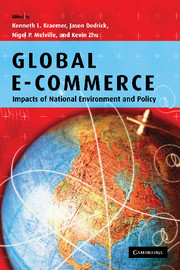Book contents
- Frontmatter
- Contents
- List of figures
- List of tables
- List of boxes
- Notes on contributors
- Introduction
- 1 Globalization and national diversity: e-commerce diffusion and impacts across nations
- 2 The United States: adaptive integration versus the Silicon Valley model
- 3 France: an alternative path to Internet-based e-commerce
- 4 Germany: a “fast follower” of e-commerce technologies and practices
- 5 Japan: local innovation and diversity in e-commerce
- 6 China: overcoming institutional barriers to e-commerce
- 7 Taiwan: diffusion and impacts of the Internet and e-commerce in a hybrid economy
- 8 Brazil: e-commerce shaped by local forces
- 9 Mexico: global engagement driving e-commerce adoption and impacts
- 10 Global convergence and local divergence in e-commerce: cross-country analyses
- APPENDICES
- Index
Introduction
Published online by Cambridge University Press: 24 October 2009
- Frontmatter
- Contents
- List of figures
- List of tables
- List of boxes
- Notes on contributors
- Introduction
- 1 Globalization and national diversity: e-commerce diffusion and impacts across nations
- 2 The United States: adaptive integration versus the Silicon Valley model
- 3 France: an alternative path to Internet-based e-commerce
- 4 Germany: a “fast follower” of e-commerce technologies and practices
- 5 Japan: local innovation and diversity in e-commerce
- 6 China: overcoming institutional barriers to e-commerce
- 7 Taiwan: diffusion and impacts of the Internet and e-commerce in a hybrid economy
- 8 Brazil: e-commerce shaped by local forces
- 9 Mexico: global engagement driving e-commerce adoption and impacts
- 10 Global convergence and local divergence in e-commerce: cross-country analyses
- APPENDICES
- Index
Summary
Motivation
The new millennium coincided with an explosion in the use of the Internet for commercial purposes. Dot.com companies in the United States such as Amazon and eBay led the way, creating online services where none had existed before. Recognizing the value of e-commerce, traditional companies also jumped online, including Wal-Mart in retail, Cisco in networking, Dell in the PC industry, and Charles Schwab in banking. In just a few short years, a company without a website was considered passé and the Internet was becoming mythologized: “A few years from now business economists may include the Internet in the Schumpeterian Hall of Fame, as an economic innovation of the same magnitude as the steam engine and the assembly lines of yore” (DePrince Jr. & Ford, 1999). Radical changes toward online business models were widely believed to be ushering in a “new economy” requiring new competitive strategies, business models, and even a new economics.
Given the major role played by the United States in developing the Internet and fostering its commercialization, other nations voiced concern that it would dominate e-commerce, spreading US culture and economic influence via electronic networks. The Internet compresses time and space, making it easier for companies to expand beyond regional boundaries. Commerce emerges as a powerful force beyond the control of individual countries, with a corollary being that the relevance of differences between countries diminishes. Taking this argument to the extreme, some predicted the emergence of a borderless global economy.
- Type
- Chapter
- Information
- Global e-commerceImpacts of National Environment and Policy, pp. 1 - 12Publisher: Cambridge University PressPrint publication year: 2006
- 1
- Cited by



